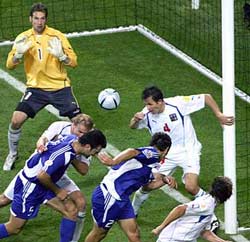If there is any justice, Traianos Dellas's silver goal winner which put Greece into the Euro 2004 final will enter football folklore as the last ever scored.

Earlier this year, the International Football Association Board, the game's ultimate law-making authority, ruled that silver and golden goals are an unfair way of deciding matches which finish level at the end of 90 minutes.
How the Czech Republic would agree with that.
In 1996 they lost the first major international tournament to be decided by sudden-death when a 95th-minute goal from Oliver Bierhoff gave Germany a 2-1 victory in the Euro 96 final.
Although the goal was disputed by the Czechs, who claimed Bierhoff was off-side, an immediate problem had been identified. There was mayhem on the pitch as the Germans celebrated and no way the match could be re-started.
UEFA was privately already having doubts about the method, but at least it seemed a fairer way of settling a drawn match than penalties.
Four years later, one semi-final, France vs Portugal, and the final between France and Italy were both decided by sudden-death golden goals.
A 117th-minute Zinedine Zidane penalty settled France's semi-final against Portugal, while a stunning David Trezeguet strike after 103 minutes gave the French victory over Italy in the final.
NEGATIVE FOOTBALL
UEFA introduced the concept of the silver goal in 2002 because it thought the golden goal put too much pressure on referees and prompted teams to play negative football.
In reality, the silver goal concept only applied to the first period of extra-time and meant that if one team scored, the other at least had until the end of the first period of extra-time to pull level.
That idea was shattered on Thursday as the Czech Republic conceded a goal one second from the end of the first period of extra-time.
As soon as play restarted, referee Pierluigi Collina ended the contest.
Advocates of the silver goal concept would argue that anything is better than reducing the outcome of an important game to the lottery of a penalty shoot-out, but in reality, little was gained from using the silver goal method.
On Thursday, in near perfect weather conditions, neither team earned any advantage from a strong breeze or a poor pitch.
One of the reasons for abolishing the silver goal was because one team could benefit unfairly from the conditions, if for example, a strong wind aided one side for the first 15 minutes of extra-time.
CLEARCUT CHANCE
It could be argued that Greece thoroughly deserved their victory by stifling the Czech attack and taking the one clearcut chance that came their way to win the match fair and square within the rules of the competition.
The silver goal rule is illogical, however, in that it denies the losing team the chance of saving the match simply by virtue of when the goal is scored.
If the Greek goal had been scored 15 seconds later, that is immediately after the extra-time interval, the Czechs would have had nearly 15 minutes to save themselves.
When the International Board abolished the method last spring, FIFA president Sepp Blatter said: "Penalties might not be the best way either, but at least both teams have an equal chance and until someone comes up with something better, this is the method we will use again in the future."
Penalties are also a cruel way of losing a game but few will mourn the end of the golden and silver goal rules.








 © 2025
© 2025